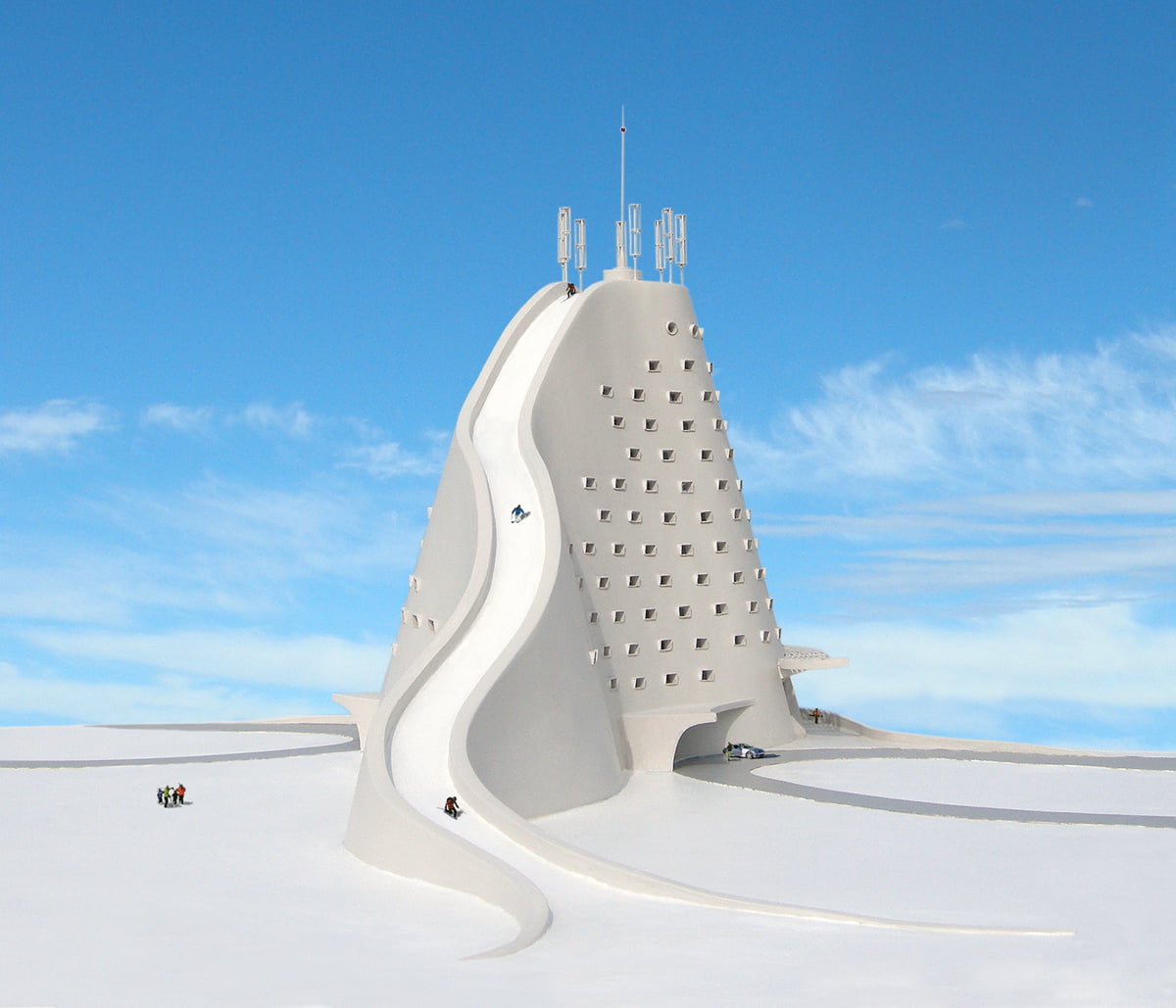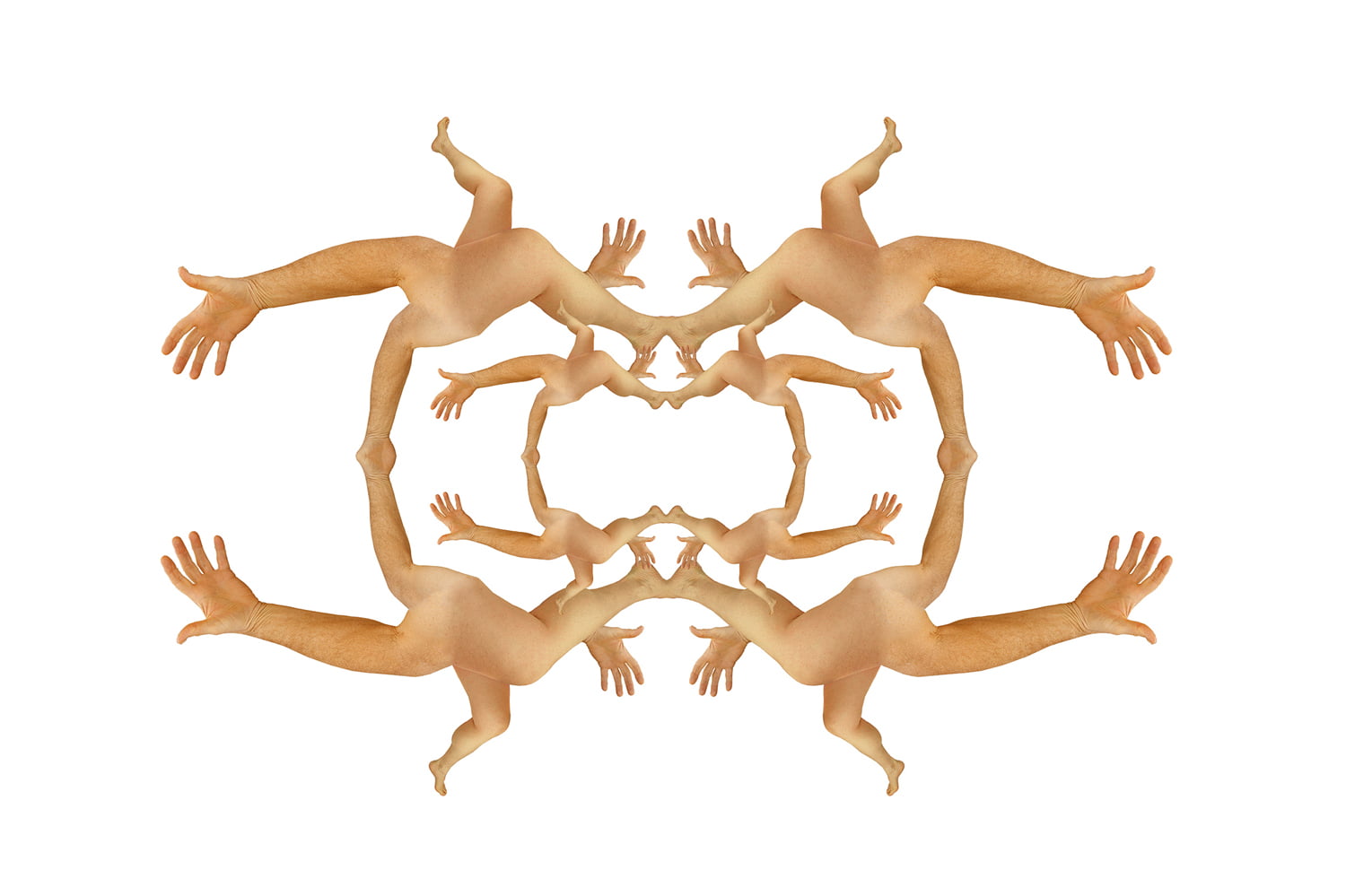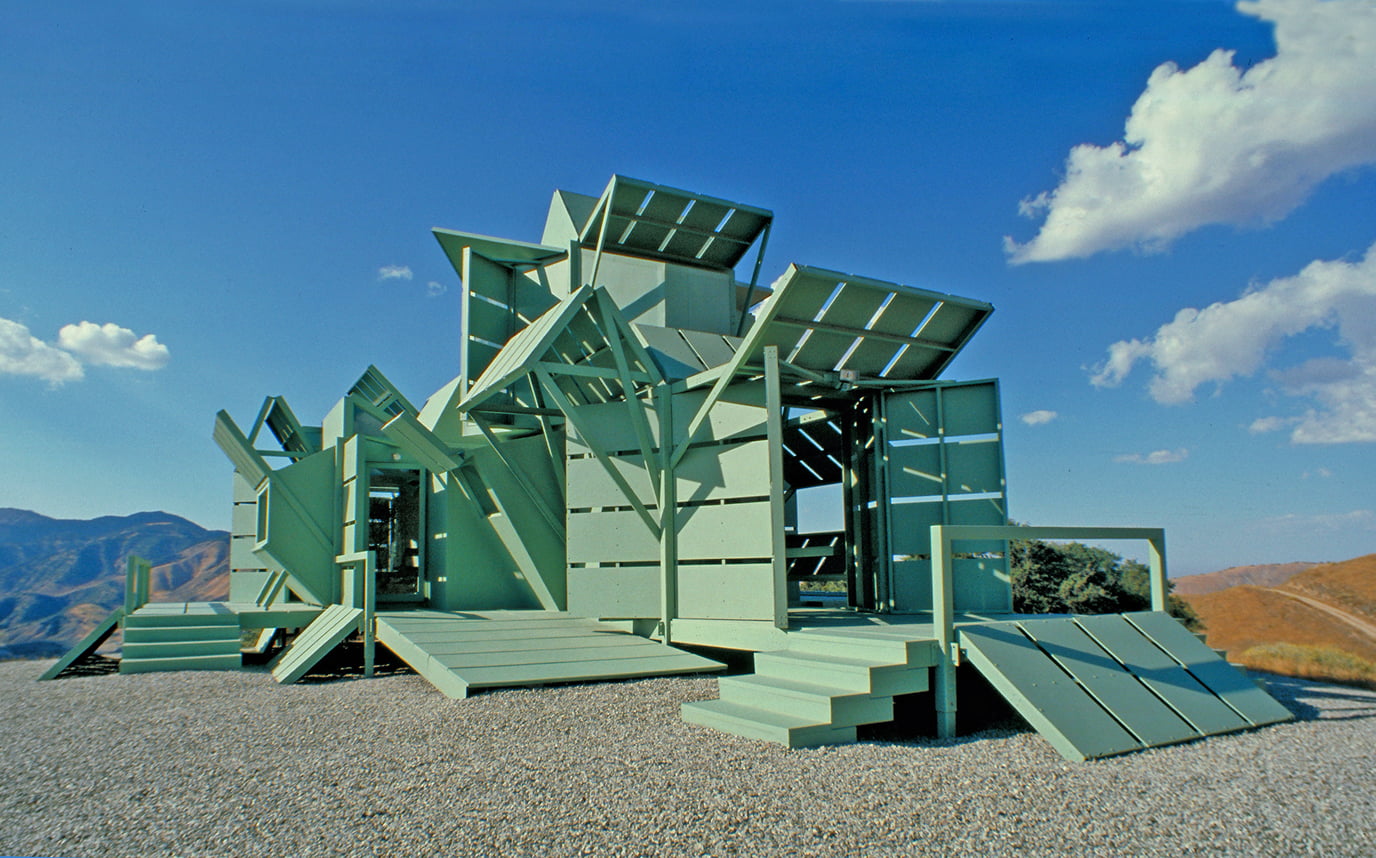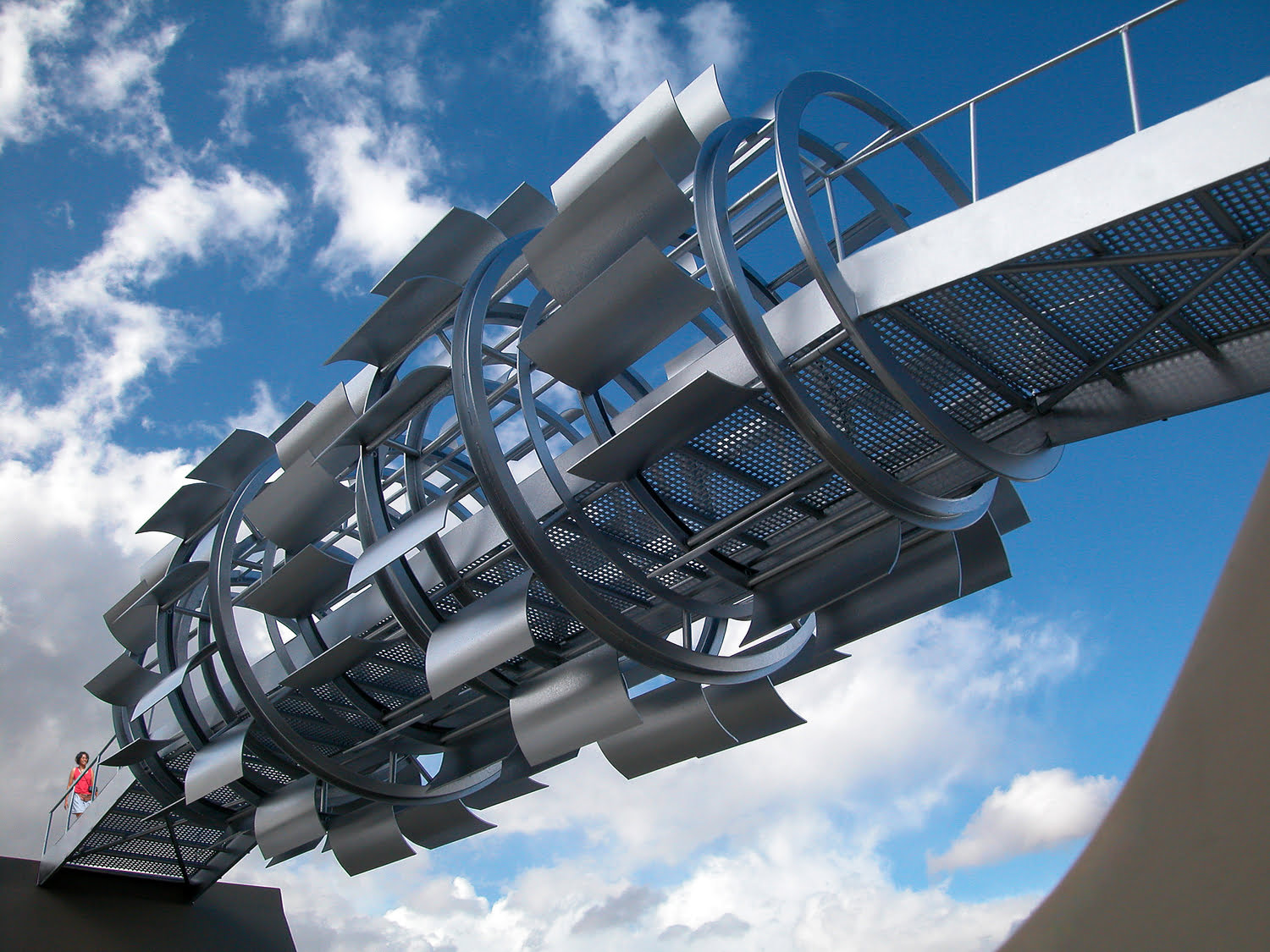“Gran parte del mio lavoro, in un modo o nell’altro, esplora nuovi modi di pensare nei termini della sostenibilità. Pertanto il mio approccio all’arte e al design si profila secondo l’habitus mentale dell’ inventore , piuttosto che secondo criteri meramente estetici, come produttore di uno stile . Oltre a molti problemi di sostenibilità , il mio approccio specifico alla creazione di arte architettonica, muove spesso dal desiderio di reinventare l’ambiente costruito, così che possa essere continuamente modificato per soddisfare le esigenze e i desideri di cambiamento dei suoi occupanti . A volte cerco di inventare sistemi e componenti che possono essere assemblati e riassemblati in molti modi diversi. Mi piace anche sviluppare l’ arte architettonica attraverso un processo di creazione di forme suscitate da riferimenti simbolici che si collegano direttamente al sito e / o alla funzione del progetto specifico . Come risultato , solitamente, si produce un’estetica che evolve in modo totalmente inaspettato”.
“Voglio reinventare il mondo intorno a me e condividere questa visione con gli altri , nel tentativo di rendere il pianeta un posto migliore per tutta l’umanità . Mi ispiro alla scienza , alla tecnologia e alla natura . Ho sempre lavorato da solo, come artista; la collaborazione con altri nasce soltanto in funzione del completamento di un progetto, che richieda, ad esempio, il ricorso ad un ingegnere. Sono stato fortemente influenzato all’inizio della mia carriera da Buckminster Fuller a causa del suo interesse per la reinvenzione di ambienti già costruiti . Uno dei miei artisti preferiti è Anish Kapoor , perché si avvicina all’opera da realizzare con la mentalità dell’inventore”.
Info:
La biografia dell’ artista-architetto neo-leonardesco
Il lavoro di Michael Jantzen (1948) è conosciuto in tutto il mondo. E ‘ stato oggetto di ampi servizi in migliaia di articoli in libri, riviste , giornali e sul web . Tra i periodici sono da segnalare Wallpaper , Architettura Magazine , Architectural Digest , l’AIA Journal, House & Garden , Popular Science , Domus , Elle Décor , Esquire , Dwell , Metropolis , Art Forum , e Newsweek .
Testate di valenza mondiale si sono occupate della sua opera, come il New York Times , il Los Angeles Times , The New York Daily News , The Chicago Tribune , Der Spiegel , Washington Star, The Kansas City Star , il Detroit Free Press ecc.
Tra i libri che illustrano la sua attività creativa , Architettura negli Stati Uniti , Architecture Now , Architettura nel 20 ° secolo , The 21st Century House, Brave New Case , Architettura Arte , High Tech , il Solar Living Source Book , e l’Atlante di Eco -Architecture .
Il suo lavoro è stato esposto in numerose gallerie ed è stato oggetto di numerosi documentari televisivi . Opere di Jantzen sono state esposte al National Building Museum , al Centro Canadese di Architettura , alla Harvard School of Design e Architettura , all’Istituto russo di Architettura , e al Museum of Modern Art di New York .
Michael ha presentato il suo lavoro in molte università e ha tenuto conferenze al convegno nazionale AIA , la convention Architettura Organica , e presso il Convention National Design Hospitality .
Jantzen è stato collocato trai pionieri, dal 1970, del movimento di design sostenibile, e ha tenuto corsi relativi a questa materia alla Washington University di St. Louis , e presso l’Art Center College of Art and Design di Pasadena in California .
Molte aziende come la Dow Chemical , Mc Donalds , John Deer , lo Stato Agenzia di Sviluppo Bi di St. Louis , e Discovery Chanel, si sono avvalsi della sua consulenza nell’ambito del design sostenibile.
Michael Jantzen è stato inoltre chiamato a creare molti progetti per varie organizzazioni come la Herman Miller Company, Strutture Avanzate Inc. , Bio Sphere 2 , e- solare , la Lawrence Hall of Science , il Fuller Institute Buckminster , l’Orto Botanico del Missouri , Massachusetts Institute of Technology, Università di Washington , Neiman Marcus , e la NASA
Tra i libri che illustrano la sua attività creativa , Architettura negli Stati Uniti , Architecture Now , Architettura nel 20 ° secolo , The 21st Century House, Brave New Case , Architettura Arte , High Tech , il Solar Living Source Book , e l’Atlante di Eco -Architecture .
Il suo lavoro è stato esposto in numerose gallerie ed è stato oggetto di numerosi documentari televisivi . Opere di Jantzen sono state esposte al National Building Museum , al Centro Canadese di Architettura , alla Harvard School of Design e Architettura , all’Istituto russo di Architettura , e al Museum of Modern Art di New York .
Michael ha presentato il suo lavoro in molte università e ha tenuto conferenze al convegno nazionale AIA , la convention Architettura Organica , e presso il Convention National Design Hospitality .
Jantzen è stato collocato trai pionieri, dal 1970, del movimento di design sostenibile, e ha tenuto corsi relativi a questa materia alla Washington University di St. Louis , e presso l’Art Center College of Art and Design di Pasadena in California .
Molte aziende come la Dow Chemical , Mc Donalds , John Deer , lo Stato Agenzia di Sviluppo Bi di St. Louis , e Discovery Chanel, si sono avvalsi della sua consulenza nell’ambito del design sostenibile.
Michael Jantzen è stato inoltre chiamato a creare molti progetti per varie organizzazioni come la Herman Miller Company, Strutture Avanzate Inc. , Bio Sphere 2 , e- solare , la Lawrence Hall of Science , il Fuller Institute Buckminster , l’Orto Botanico del Missouri , Massachusetts Institute of Technology, Università di Washington , Neiman Marcus , e la NASA
—————————————-
Michael Jantzen: “Most of my work attempts to merge art, architecture, technology, and sustainable design, into one unique experience. I have not been educated as an architect, but rather as an artist. As an artist, I often use architecture as my art form. Much of my work, in one way or another, explores new ways of thinking about sustainability. I always approach my art and design as an inventor, rather then as a stylist. In addition to many sustainable issues, my specific approach to creating architectural art, often involves a desire on my part to reinvent the built environment, so that it can continually be altered to meet the changing needs and desires of its occupants. Sometimes I attempt to invent systems and components that can be assembled and reassembled in many different ways. I also enjoy developing architectural art through a process of creating forms from symbolic references, which relate directly to the specific site and/or function of the project. As a result, usually an aesthetic evolves that is totally unexpected. In general, I want to reinvent the world around me, and share that vision with others, in an attempt to make the planet a better place for all of humanity”.
“I am inspired by science, technology, and by nature. I have always worked alone as an artist and only work with others when I need their help to complete a project, such as when I hire an engineer. I was greatly influenced early in my career by Buckminster Fuller because of his interest in reinventing the built environment. One of my favorite artist working today is Anish Kapoor because he also approaches his work as an inventor”.
Biography
Michael Jantzen’s work is very well known around the world. It has been featured in thousands of articles in books, magazines, newspapers, and on the Web. Some of the magazines include, Wallpaper, Architecture Magazine, Architectural Digest, the AIA Journal, House &Garden, Popular Science, Domus, Elle Décor, Esquire, Dwell, Metropolis, Art Forum, and Newsweek.
Some of the newspapers include, The New York Times, the Los Angeles Times, The New York Daily News, The Chicago Tribune, Der Spiegel, the Washington Star, The Kansas City Star, the Detroit Free Press, the Tampa Tribune, and the St. Louis Post Dispatch.
Some of the books include, Architecture in the United States, Architecture Now, Architecture in the 20TH Century, The 21stCentury House, Brave New Houses, Architecture Art, High Tech, the Solar Living Source Book, and the Atlas of Eco-Architecture.
His work has also been shown in many galleries, and on various TV documentaries. It has been exhibited at the NationalBuildingMuseum, the CanadianCenter for Architecture, the Harvard School of Design and Architecture, the Russian Institute of Architecture, and at the Museum of Modern Art in New York.
Michael has presented his work at many universities, and has given keynote lectures at the National AIA convention, the Organic Architecture convention, and at the National Hospitality Design Convention.
Michael has been sited as one of the pioneers of the sustainable design movement from the 1970s, and has taught sustainable design classes at WashingtonUniversity in St. Louis, and at the Art Center College of Art and Design in PasadenaCalifornia.
Many companies such as, Dow Chemical, Mc Donalds, John Deer, the Bi State Development Agency of St. Louis, and the Discovery Chanel, have hired him as a sustainable design consultant,
Michael has also been hired to create many projects for various organizations like, the Herman Miller Company, Advanced Structures Inc., Bio Sphere 2, e-solar, the Lawrence Hall of Science, the Buckminster Fuller Institute, the MissouriBotanical Gardens, the Massachusetts Institute of Technology, WashingtonUniversity, Neiman Marcus, and NASA.
For over 40 years, Michael Jantzen has directed his work as an artist and designer toward the reinvention of an eco-friendly built environment. He has designed many example of this in the form of experimental houses, hotels, bridges, spas, wineries, visitor centers, pubic gathering places, greenhouses, and many public and private art projects





No comments:
Post a Comment